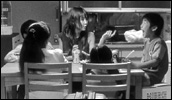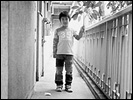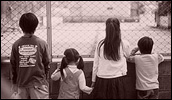Nobody Knows
- Year
- 2004
- Original title
- Daremo Shiranai
- Japanese title
- 誰も知らない
- Director
- Cast
- Running time
- 141 minutes
- Published
- 22 November 2005



by Adam Campbell
Like his previous film Distance (2001), which involved an Aum-like cult, Hirokazu Koreeda's Nobody Knows was inspired by a real case of child abandonment in Tokyo, 1988. As with Distance, the headline event being referenced serves as purely the catalyst for a much more personal tale. With Nobody Knows, Kore-eda took the real case, mulled it over in his head for fifteen years and used it as only the skeleton around which he built this piece of fiction, filmed with a documentary eye. The plot is simple: scatty single mum Keiko (television talento You) and 12-year-old son Akira (Yagira in the performance that made him the youngest ever Best Actor winner at Cannes) move into a nice new apartment in Tokyo. What the landlord doesn't know is that Keiko has three other children hidden in her flat, reserved Kyoko (Kitaura), rambunctious Shigeru (Kimura) and the youngest sister, Yuki (Shimizu). When Keiko takes off with a new boyfriend, Akira is left with the responsibility of managing the household and looking after his younger siblings.
The documentary style that Koreeda is known for is more prominent here than in After Life (1998), and more successful than in Distance. While the camera is often static, it doesn't come across so much like a business training video as Distance sometimes could. However much that aesthetic may have suited the subject of that film, the camera work in Nobody Knows is easier to appreciate, catching beautiful moments of realism - childish realism, rather than stark or flat realism. One of Koreeda's great successes is to put the audience on a level with the children, not by hackneyed devices such as dropping the camera to kid height, but through focusing on their interests, habits and practices. Several shots in the film focus on their hands touching things, the kids fidgeting. For instance, Akira's dirty hands feeling the grooves on the suitcase, right at the start of the picture. The children of Nobody Knows are depicted as tactile beings who learn and explore through touch, taste, smell. The only words to come out of their mouths are exactly what they are feeling. The director has managed one of those rare feats, putting actual children on screen.
Wisely, Koreeda devotes plenty of film to these explorations and small pleasures, and it is these that balance the melodramatic elements of the story with the other side of things, the side that embraces the fact that being home alone can be a childhood fantasy. This in turn increases the melodrama, with Akira being the one who is aware that the fantasy is based on an important reality, their ever-dwindling supply of money. When it comes to pulling at the heart strings, less is more and Koreeda seems far happier showing us the kids at play then any crying or belly-clutching. For the audience, obsessed with how their time in a darkened room is being spent, the emphasis on these trivial actions could become a bore. However it's not long before we fall into the logic of the games ourselves and their worth becomes priceless. The rhythm of Akira throwing and catching a bottle becomes hypnotising and every game of rock-paper-scissors or robot-bashing becomes thoroughly entertaining. Recognising the importance and appeal of their activities is a big step into the world of the children, unlike in Distance where the loose attention and adult reserve often led to the picture becoming languid.
Every day objects are transformed into totemic objects of memory with the departure of the mother, and once again it's not just visual, but their smells, their touch. Yuki's toy rabbit wears a red piece of string like Keiko's bracelet, making the bunny more of an adorable attempt at a voodoo doll. Older sister Kyoko returns time and again to the touch and smell of her mother's bottle of nail polish, and the stain she made on the floor. Some negative connections could be made to famous stains in Japanese cinema (from the blood-stained room in Throne of Blood to the damp trouble of Dark Water) in which stains are often an ominous sign, an indication of something bad from the past reaching into the present. In Nobody Knows, however, the stain seems a much more positive signal. It is the first step the children make in redecorating the flat, the first act in turning that place into their home.
With sights, sounds (shower water drumming on a bath stool), and even smells (pots of curry, steaming cup noodle), Kore-eda builds up a series of references to the wealth of sensations that make up everyday Japanese family life. Rather than constantly distance the audience with a focus on the strange and unusual nature of the kids' situation, Kore-eda draws them in by showing a shared, traditional familiarity. The efforts of the children to continue on in these patterns as a family, rather than be separated, is marked by their astonishing ability to succeed. Though abandoned by all parents (each comes from a different dead-beat dad), the children are resilient, capable and, in the case of Shigeru at least, happier without the adults around. Yuki, being the youngest, misses her mother the most yet crucially we only see Yuki draw two portraits. One is of her mother Keiko and the other is of Saki (Kan), the high school girl that Akira befriends. At several times, the older Saki takes over the mother role from Keiko and Kyoko. When in trouble, it is to Saki that Akira goes and confides in. The last train scene provides the final and most important touch, Saki's fingers on Akira's hand, the human contact which bridges the gap between family and world, between boyhood and manhood for Akira. The implication seems to be that children have formed some kind of working family where adults have failed.
Though the film is more a celebration of children than an attack on adults, some criticisms still exist, though levelled more at society in general than specific individuals such as the mother. Keiko is depicted in many ways as the fifth child, with a level of maturity about equal to Shigeru, perhaps explaining their occasional antagonism. Her childish nature gives the kids as many laughs as it does hardships later. At first, she seems to adopt the ways of children in order to speak to them. Later, it becomes apparent that she is perhaps not entirely a mentally balanced adult, when her practices become more and more negligent and selfish. At certain points, she even becomes slightly malicious, such as the bullying tone taken against Shigeru or Kyoko when she spills the nail polish. The money she sends home is naïve, seeming a lot when put in an envelope, but almost impossible to stretch a year, a fact Akira can recognise that his mother is oblivious to.
That Keiko is not the focus of attack in the film does not mean she is immune to it; her character represents a section of the society on which Koreeda seems to apportion more blame. An exaggeration of the modern Japanese woman perhaps, Keiko is totally obsessed with her own happiness, clinging to her fading youth. She is easy, ignorant, and well dressed. With four kids to four different fathers and money problems, her answer is to spend more on presents (the kind of thing that impresses her) and eventually run away from her responsibilities. As her children wear holes in their clothes, she struts around in fashionable labels, Prada boots, Louis Vuitton bags. She typifies the grown up kogal, now getting older but no wiser. Nor is she the only woman with the finger pointed at, albeit briefly. The man in the pachinko parlour, wrongly accused of being Yuki's father, mentions that his girlfriend has maxed out his credit cards and run up massive debts. Even the eventual mother figure Saki initially thinks prostituting herself to businessmen is an acceptable way to make money.
Keiko's refusal to take responsibility damns not necessarily her, but the trend to which she can be associated. As Susumu Terajima says in Distance "Family is what it's all about." something his cult-member wife failed to realise, and something equally ignored by Keiko. In discussing the benefits of the group, all the cult members in Distance extol the freedom and support it gives themselves, and all ignore the family they already had. Personal pleasure, be it romantic love, spiritual belonging or expensive things, are a god-given right in the minds of these characters, a right which supersedes all other arrangements. As Keiko complains to her children "Haven't I the right to be happy?" In the pursuit of happiness, these people abandon their responsibilities to the families they helped create, runaway mothers and dead-beat dads. Keiko's problem is not only that she abandons her children, but that her generation is selfish, if the two can be separated a little.
The harsh opinion of one-parent families also comes under scrutiny. As Keiko herself puts it, "People don't like children who haven't got fathers" and she herself feels the need to cover the fact when she introduces herself to the landlords. Of course all the children have fathers, but they simply are not involved. The country in this sense is guilty of double standards, on one hand promoting the image of the good-time girl, and on the other trying to sweep the results under the carpet, namely single mothers with four children. Nobody knows because simply nobody wants to know. Neighbours in the same building take very little notice of what is going on, adults being fooled by four children. Any alarm that is raised only comes about when the rent and bills aren't being paid, and is quickly forgotten about when the money turns up. The kids, Koreeda says, are all right, forming themselves into a quasi-hippie commune, planting flowers and retaking the streets, using public resources. The tragedy lies not necessarily in the situation of the children, but that society has allowed it to happen, and would rather not know.